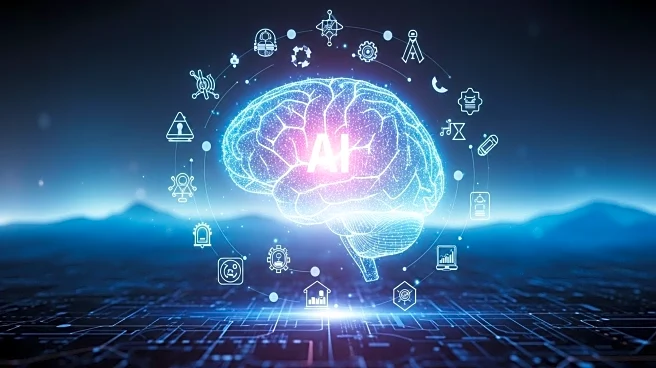What's Happening?
The rapid advancement of artificial intelligence (AI) is reshaping the landscape of education and workforce development in 2025. As AI technologies evolve, traditional educational achievements such as degrees and certificates are becoming less relevant, with skills becoming obsolete in just a few years. This shift is prompting organizations to focus on dynamic skill-building, particularly in AI and generative AI. The AI in education market, encompassing K-12, higher education, and corporate training, is projected to grow significantly, driven by the demand for personalized learning and scalable educational technology solutions. Companies like Udemy are experiencing a surge in AI-related course enrollments, highlighting the growing need for practical AI proficiency.
Why It's Important?
The increasing demand for AI skills is transforming how education and training are approached in the U.S. As AI becomes integral to various industries, the ability to adapt and learn continuously is becoming crucial for workforce competitiveness. This trend is particularly significant for Gen Z, who are entering the workforce with a focus on adaptability and critical thinking. The shift towards continuous learning and skill fitness is expected to drive business gains, as employees who can effectively use AI while understanding its risks and impacts will be highly valued. However, the integration of AI in education also raises concerns about potential biases and the need for responsible deployment to ensure equitable benefits.
What's Next?
As AI continues to integrate into educational and professional environments, institutions and companies are likely to adopt more AI-driven learning tools and simulations. This will require careful management to avoid reinforcing existing inequalities and to ensure that AI enhances rather than detracts from learning experiences. The focus will be on running controlled pilots, measuring outcomes, and iterating on AI implementations to maximize benefits. Additionally, there will be an ongoing need to balance AI-driven learning with traditional education to maintain strong foundational skills and critical thinking abilities.
Beyond the Headlines
The rise of AI in education and workforce development could lead to a cultural shift where learning is viewed as a lifelong discipline rather than a finite achievement. This perspective may foster a culture of continuous improvement and adaptability, essential in an AI-driven world. As AI becomes an invisible infrastructure in education, the role of universities and educational institutions may evolve to complement AI, providing a holistic approach to skill development that meets diverse learner needs.











